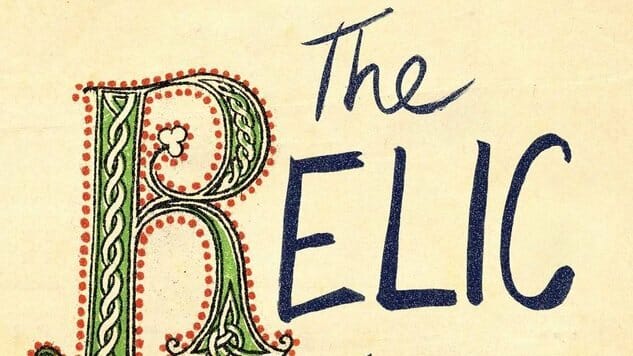
Given that he’s best known for razor-sharp political satires like Thank You For Smoking, it should come as no surprise that Christopher Buckley recognizes the immense potential for comic absurdity in the subject matter of his new novel, The Relic Master. Set in the Germanic states of central Europe in 1517 (amidst the heady atmosphere of rampant corruption and whore-mongering popes that characterized the Catholic Church on the eve of the Reformation), The Relic Master chronicles the adventures of mercenary and former monk Dismas. The titular relic master, Dismas is a leading trader in purported holy relics, such as Saint Peter’s fishing boat or the bones of apostles. He serves two prominent clients high in the Church hierarchy, both of whom habitually sell indulgences to unfortunates looking to buy their way out of Purgatory.
 One client, Frederick the Wise, Elector of Saxony, boasts the largest collection of church relics outside the Vatican. The more garish collection belongs to his rival (and fellow Dismas client) Albrecht of Brandenburg, Elector and Archbishop of Mainz. Both noted historical figures, Frederick the Wise is perhaps best remembered for his controversial decision to protect the Church’s most vociferous critic, Martin Luther, whose initial assault on Church corruption was occurring as The Relic Master’s events take place. While Buckley portrays Frederick as mildly corrupt, patient and subdued by rapidly declining health, Albrecht is aggressive, self-absorbed and fiendishly unscrupulous.
One client, Frederick the Wise, Elector of Saxony, boasts the largest collection of church relics outside the Vatican. The more garish collection belongs to his rival (and fellow Dismas client) Albrecht of Brandenburg, Elector and Archbishop of Mainz. Both noted historical figures, Frederick the Wise is perhaps best remembered for his controversial decision to protect the Church’s most vociferous critic, Martin Luther, whose initial assault on Church corruption was occurring as The Relic Master’s events take place. While Buckley portrays Frederick as mildly corrupt, patient and subdued by rapidly declining health, Albrecht is aggressive, self-absorbed and fiendishly unscrupulous.
Although he deals on one end with hawkers of dubious relics and on the other with men who bilk pilgrims in God’s name, Dismas holds himself to standards of integrity at least a little higher than those of others in his business: “In all of his years of relic hunting, Dismas had never wittingly purchased or sold a relic he knew to be fraudulent.” His reasons for doing so are both reverent and practical, given that the constant trading of fake relics would cut the bottom out of his industry. At the center of Dismas’ trade in 1517 are perhaps the most controversial and recklessly counterfeited relics of all: shrouds rumored to be the burial cloth of Christ.
Albrecht relentlessly pressures Dismas to deliver him a shroud, and this aggressive pursuit of the relic-to-end-all-relics sets into motion the wild ride that Buckley’s book delivers. The Relic Master takes flight as a rollicking caper story following Dismas’ fateful decision to travel 600 miles to steal the Shroud of Turin, “the most closely guarded relic in Christendom.” This impossible quest thrusts the novel headlong into National Treasure territory, but with masterfully developed historical figures at its center.
Hurtling toward a conclusion as improbable as, say, St. Bartholomew’s jawbone turning up at a flea market, The Relic Master is impossible to put down once you’re caught in its thrall. But it’s not just the book’s page-turning pace that makes it so compelling; it’s Buckley’s stunning gift for unsparing satire. He writes with comic contempt for the hypocrisies that define his characters, though Dismas emerges as a sort of hero—if only for the heaping indignities he endures.
The genius of Buckley’s satire is not merely its acuity but its balance. Much as in Thank You For Smoking, his take on papal indulgence suggests that he’s not so much concerned with the moral bankruptcy of false righteousness as with its enduring marketability…and the lies those who partake in it tell themselves to sustain it.
But what’s most refreshing about The Relic Master is the relatively untrodden terrain of its 500-year-old subject matter, worlds apart from the quasi-Orwellian takes on contemporary advertising and globalism that abound in satiric topical fiction today. How rare it is to see a wit like Buckley’s applied to a topic like this one:
In addition to his other talents, [Grand Inquisitor Johann] Tetzel was a supple theologian. He’d pioneered a new form of indulgence whereby you could buy full forgiveness for sins you had not yet committed. Even Jesus might marvel at that. It had aroused a bit of controversy, along with his sensational claim that a papal indulgence could free you from Purgatory even if you had—shudder—violated the chastity of the Mother of God.
Truth be told, even a satirist of Buckley’s gifts couldn’t make much of an impact with a book like Thank You for Smoking these days. Twenty years after that book’s publication, it’s virtually impossible to lampoon the self-justifying double-speak of the tobacco, alcohol or firearms industry without finding oneself invariably outflanked by the twisted talking points of the characters’ real-life counterparts. If nothing else, by turning his attention to the 16th-century shenanigans of central Europe’s “supplest” theologians in The Relic Master, Buckley has made a shrewd career move and found a superb vehicle for his acclaimed satiric talents.